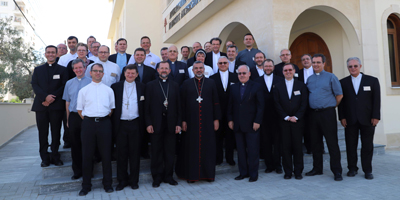The culture of the encounter was the focus of the annual meeting of the General Secretaries of the Catholic Bishops’ Conferences in Europe, from June 29 to July 2, in Cyprus, the Island of the Apostles Paul and Barnabas. In Nicosia, the General Secretaries confirmed their commitment to promoting the culture of encounter within the Church, in ecumenical relations, and with the whole world. This requires a sympathetic attitude and to be ready to help others, along with the freedom to be oneself. True encounters have a vertical dimension, with God, and a horizontal dimension, with our brothers, and this is why the Church, committed to giving reasons of hope to the Continent, goes out to meet others to proclaim the Gospel of Jesus, who brings true justice and peace to the world.
The theme, The culture of the encounter was first developed with a reflection on Europe and the Church in Europe by the Secretary General, Msgr. Duarte da Cunha, who, after 10 years, will finish his mission at the CCEE next September. The Maronite Archbishop of Cyprus, H. Ex. Msgr. Youssef Soueif, who hosted the meeting, presented a reflection on “the spiritual food that Europe needs,” followed by working groups aimed at exploring the encounter-related challenges and experiences promoted by the Catholic Bishops’ Conferences. Finally, we heard the testimony of some European Church networks (Comece, Caritas Europe, and Justice and Peace) – border experiences with the milieus of politics, culture, and poverty – which showed that their mission can become a witness of hope only if it is based on an experience of lived faith.
Although many aspects could lead us to outline a negative view of the current situation on the Continent, however, it is possible to see signs that show that Europe is experiencing a Kairos (a favorable opportunity) echoing the voice of Jesus when he told his disciples, “Do not be afraid … I am with you” (Mt 28:5-20).
In his reflection on Europe and its deepest needs, the Maronite archbishop focused on three key words that are also three theological categories, the Oekonomia of salvation (the presence and action of God in history), Koinonia (communion), and Diakonia (service). Christians are certain that God is always present and active in history, transforming the realities he touches. This is the Oekonomia of salvation. After the creation, which bears witness to the love of God, the fall of man was not the last word and God, in Jesus Christ, renewed humanity with his forgiveness, giving it a new life. The Church embodies this alliance between God and humanity that testifies that God loves the world. This is how the Church, being in itself a communion, becomes hope for Europe. Life in Christ, with Christ, and for Christ is the beauty and the salvation of Europe. The service (diakonia) to others – especially to the poorest – to which every Christian faithful is called to, responds to the third and last theological category dealt with by Msgr. Soueif. The care of ‘human’ in all its dimensions is precisely the charism and the gift that the Church in Europe can offer. Christians cannot separate their relationship with God and the service for their brothers.
In other words, the Church in Europe, born of the encounter with God, is at the service of the culture of encounter, which creates occasions for reconciliation and purification of hearts. This is particularly evident and it is a constant and urgent commitment that the Catholic Church in Cyprus is pursuing in favoring opportunities for peace-making encounters on the island, divided between a Greek part and a Turkish part since 1974.
In the working groups, the General Secretaries discussed about how the Catholic Bishops’ Conferences develop the culture of the encounter and what are the conditioning factors, the key points and places that can help the promotion of this culture. The importance of an attitude of willingness to meet, to listen, and to share in the respect and appreciation of everyone’s cultural diversity has been emphasized. Particular attention should be given to educating for the culture of the encounter.
This meeting was also a significant opportunity to collect information and promote sharing around current issues that are important for all. During the meeting, the annual report on CCEE activities was presented.
In Cyprus, the participants met several Orthodox metropolitans and visited the Orthodox archbishopric of the Island. They also visited the headquarters of Christian ecumenical broadcaster SAT7.
The meeting speakers list also included Fr. Jerzy Kraj ofm, Patriarchal Vicar for Latin Catholics in Cyprus; Msgr. Wahib Khawaja, Secretary General of the Assembly of the Catholic Patriarchs and Bishops of Lebanon; and Fr. Pietro Felet, Secretary General of the Assembly of the Catholic Ordinaries of the Holy Land. They have informed about the work and the current situation of the bodies they represent.
The meeting was marked by various moments of prayer and by numerous occasions to meet the various local Catholic communities. On Sunday, July 1, the General Secretaries met with Caritas Cyprus Koinonia and received information about the work it carries out for migrants and asylum seekers. They visited the Maronite villages of Ayia Marina, Assomatos, Karpasha, and Kormakitis, in the Northern part of the island, and they took part in a “peace-making evening” of music, dances, and songs with the local catholic young people, concluded by a dinner prepared by the Kormakitis Parish Committee. In this way, they had the opportunity to experience the typical Cypriot hospitality and, in turn, to witness their solidarity with the Maronite community. In fact, as it is also the case with other Christian communities, they wish to return to their villages. This is a crucial issue for the existence and the future of the community.
In Cyprus, the general secretaries prayed for all those situations in Europe that demand peace, and for peace in the Middle East.
Photos are available here.
The news release is available in English, French, German, Greek and Italian.

